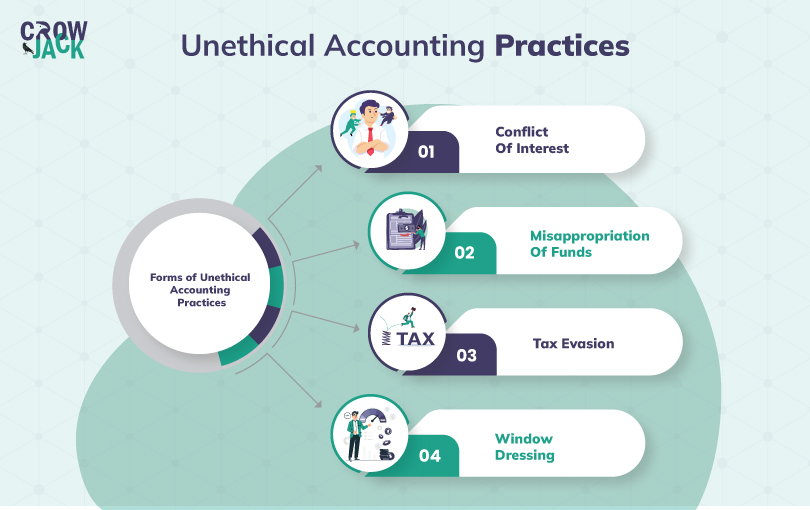Overview
The goal of accounting, the language of business, is to offer clarity and understanding into an organization's financial situation. However, some people and businesses have made the decision to veer off the straight and narrow, turning to dishonest means that jeopardise the entire basis of confidence and trust. But before getting into that, it is essential to understand what is accounting fraud that can lead unethical accounting practices in businesses in workplaces.

Table of Contents
What is accounting fraud?
Accounting fraud is the intentional manipulation or misrepresentation of financial data in the accounting records or financial statements of an organisation. In order to give stakeholders, investors, or regulators a false and misleading impression of the company's financial health, it entails dishonest practises to misrepresent revenue, expenses, assets, or liabilities. Accounting fraud is prohibited, and those who engage in it risk facing harsh legal repercussions as well as financial fines.
Accounts and finance-related ethical issues in the corporate world can prevail both from the employee side as well as the employer side. To elaborate further, some of the forms of accounting and financial ethical issues are likely to prevail in the corporate world.
Forms of Unethical Accounting Practices

1. Conflict of interest
Conflict of interest is a critical concern in various industries and organisations. To effectively manage and mitigate these conflicts, many businesses rely on specialised conflict-of-interest accounting software. In simpler terms, conflict of interest occurs when the private interests that an individual or a group pursues are in conflict with their professional responsibilities and obligations. In the financial context, conflict of interest exists when an individual tries to gain personal financial gains that are unfair and in conflict with their professional obligations. For instance, if a full-time accountant at an organization offers freelancing accounting services to competitor firms for personal gains, it will be an act of conflict of interest.
2. Misappropriation of funds
Misappropriation of funds refers to utilizing the company’s funds illegally for monetary benefits with or without seeking permission from other stakeholders. For instance, an employer takes money from company funds for his or her personal use. However, in the official records, the employer reflects that amount as supplier payment and raises fake invoices to validate the misappropriation. It is noteworthy that the misappropriation or manipulation of finances can either be done by employees or even employers. Besides, there are various innumerable instances of C-suite executives being fired for misappropriation of funds.
3. Tax evasion
Tax evasion refers to providing false information in the form of fake financial statements to tax authorities in order to evade the tax liabilities of the company. It is one of the most common forms of unethical accounting practices in businesses that occur all around the world. In fact, as per statistics, United Stated only has more than 5000 investigations of tax crimes in the last 3 years.
4. Window dressing
Window dressing in accounting terms is concerned with presenting falsified information such as an increase in profit margin in the financial statements before attracting bids for public investment in the company or luring new investors/lenders. This is an ethical issue because it can mislead various stakeholders of the company. Some of the reasons for window-dressing the financial statements of the company are mentioned below
- To attract more shareholders or investors.
- To manifest a company as financially stable.
- To reflect a positive image in front of its consumers.
- A positive image can also influence the market prices of the share
Moving ahead, mentioned below are the effective measures that can be taken by businesses to ensure the elimination of unethical accounting practices in a workplace
Measures to avoid Unethical Accounting Practices
1. Division of accounting duties
In any organization, all accounting duties should not rest with one or two people as they will otherwise feel empowered to manipulate the accounts. There should be clear segregation of accounting duties wherein different people are responsible for raising invoices, processing payments, and maintaining the records of financial ratios of the company. The overall supervision should rest with the chief financial officer, who collaborates with either a regular or a fractional CRO (chief revenue officer) to create a systematic process of handling accounts. The CFO should promote great transparency in the financial system of the organization.
2. Verifying financial statements with business bank accounts
The on-paper financial statements should be cross-checked with the transactions reflected in the business bank accounts. Given the convenience of internet banking in contemporary times, such verification can be done without any hassle or without investing much time.
3. Regular audits
Key audit areas need to be identified by the top management and for these areas, auditing should be done on a regular basis to ensure there are no missing gaps. When there are regular audits, it will act as a deterrent to those looking to commit accounting frauds and will also help in identifying financial manipulations in real-time. Cash, invoices, vendor payments, and inventory are some of the key audit areas that should be closely monitored.
4. Stringent internal controls
Well-established and strict internal controls can be of great help in preventing financial fraud. These internal controls can exist in the form of limited access to inventory, restricting employees to access financial information, multi-person authorizations, automation in accounting practices, and regular review of audit logs.
For the effective comprehension of the unethical accounting practices in businesses, below given is the one of the popular unethical accounting examples which states the Enron accounting scandal, an energy and commodities service company in the United States.
Real-life case study
Enron Scandal
Formed in 1985, Enron was one of the most successful energy companies in America and was the only company that was labeled as “America’s Most Innovative Company” by Fortune for 6 consecutive years from 1996 to 2001. However, In 2001, due to their unethical practices that were concealed for a long time, the company suffered heavy losses.
To elaborate, the auditor at Enron conspired with an accounting firm named Arthur Andersen LLP and signed false and manipulated financial statements for consecutive years. The seriousness of the issue came out in mid-2001 when multiple analysts started analyzing the public financial statements of the company. As the details of the fraud came forward, the company started experiencing a downfall. As a consequence, the market share of the company went from $ 90 to $1 in November 2001. Subsequently, Enron filed for bankruptcy protection on December 2, 2001.
The scandal resulted in many new rules and regulations being introduced to increase the accuracy of financial reporting of every company. The most important law that came out at that time was the Sarbanes - Oxley Act (2002) which defined harsh penalties for perpetrators trying to destroy, alter or fabricate any type of financial records.
The revelation of such deep-rooted financial frauds violating accounting ethics destroyed one of the well-established energy firms in America overnight. The company that was accountable for a value of $60 billion in terms of assets, went bankrupt in no time.
Key takeaway - Through this case study of Enron accounting scandal, we observed that the manipulation of financial records can result in the dissolution of the whole company. Therefore, it is crucial for employees to perform ethical accounting practices in the most transparent and effective manner.
FAQs
How do unethical accounting practices affect a company?
In addition to harming a company's reputation, unethical accounting practices can also result in financial losses and legal implications. Potential clients and business partners might be reluctant to work with the company as investor confidence may decline, which could have an impact on stock prices.
What are the repercussions of using unethical accounting techniques in terms of law and regulation?
Legal and regulatory implications can be severe if unethical accounting practices are used. Criminal prosecution, substantial penalties, licence or certification revocation, and civil lawsuits by harmed parties seeking damages are all possible outcomes for people or organisations. Furthermore, the damaged reputation brought on by such actions can sabotage potential business possibilities and erode stakeholder, investor, and customer trust.
Pervious Issue
Health and Safety IssuesNext Issue
Privacy Invasion
 Proof Reading
Proof Reading  Copy Writing
Copy Writing  Resume Writing
Resume Writing  Blogs
Blogs Guides
Guides SOP's
SOP's Student Resources
Student Resources Research Topics
Research Topics Login
Login Register
Register